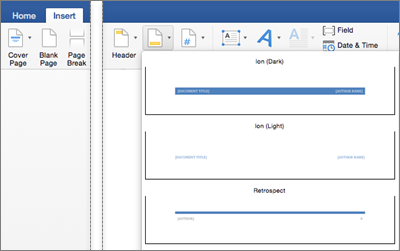

- WORD FOR MAC 2011 HEADER DIFFERENT FIRST PAGE HOW TO
- WORD FOR MAC 2011 HEADER DIFFERENT FIRST PAGE FOR MAC OS
- WORD FOR MAC 2011 HEADER DIFFERENT FIRST PAGE SOFTWARE
- WORD FOR MAC 2011 HEADER DIFFERENT FIRST PAGE PC
- WORD FOR MAC 2011 HEADER DIFFERENT FIRST PAGE WINDOWS
WORD FOR MAC 2011 HEADER DIFFERENT FIRST PAGE FOR MAC OS
įollowing the precedents of LisaWrite and MacWrite, Word for Mac OS added true WYSIWYG features. It was also notable for its very fast cut-and-paste function and unlimited number of undo operations, which are due to its usage of the piece table data structure. This was made easier by Word for DOS having been designed for use with high-resolution displays and laser printers, even though none were yet available to the general public.

WORD FOR MAC 2011 HEADER DIFFERENT FIRST PAGE SOFTWARE
In 1985, Microsoft ported Word to the classic Mac OS (known as Macintosh System Software at the time). However, Microsoft steadily improved the product, releasing versions 2.0 through 5.0 over the next six years. It was not initially popular, since its user interface was different from the leading word processor at the time, WordStar. Advertisements depicted the Microsoft Mouse and described Word as a WYSIWYG, windowed word processor with the ability to undo and display bold, italic, and underlined text, although it could not render fonts. Unlike most MS-DOS programs at the time, Microsoft Word was designed to be used with a mouse. That year Microsoft demonstrated Word running on Windows.
WORD FOR MAC 2011 HEADER DIFFERENT FIRST PAGE PC
Free demonstration copies of the application were bundled with the November 1983 issue of PC World, making it the first to be distributed on-disk with a magazine. Its name was soon simplified to Microsoft Word. Microsoft announced Multi-Tool Word for Xenix and MS-DOS in 1983. Simonyi started work on a word processor called Multi-Tool Word and soon hired Richard Brodie, a former Xerox intern, who became the primary software engineer. In 1981, Microsoft hired Charles Simonyi, the primary developer of Bravo, the first GUI word processor, which was developed at Xerox PARC. Main article: History of Microsoft Word Origins
WORD FOR MAC 2011 HEADER DIFFERENT FIRST PAGE WINDOWS
Subsequent versions were later written for several other platforms including IBM PCs running DOS (1983), Apple Macintosh running the Classic Mac OS (1985), AT&T UNIX PC (1985), Atari ST (1988), OS/2 (1989), Microsoft Windows (1989), SCO Unix (1990), and macOS (2001).Ĭommercial versions of Word are licensed as a standalone product or as a component of Microsoft Office 365, or Microsoft 365 Premium subscription, Windows RT or the discontinued Microsoft Works suite. It was first released on October 25, 1983, under the name Multi-Tool Word for Xenix systems. Microsoft Word is a word processing software developed by Microsoft. This can be useful if you have a basic Word setup with a minimalistic top bar, or if you have some font issues./ December 12, 2021 58 days ago ( ) Instead of going through the Insert menu, double-clicking at the bottom or top of a page will bring up the menu you will need to make header and footer adjustments. From that window you can edit content, adjust the positioning, and even choose to remove footers from your document. Double-clicking a footer or a header will bring up the Word Header & Footer window. Second, you could just double click the footer at any time and edit it that way. However, if you use the Different Odd & Even Pages option, then even and odd footers you’ve created will repeat throughout the document First, when using the Different First Page option, the first page footer won’t be reproduced anywhere else in the article.

Once you choose to remove the footer from a document it will do it for all your pages, whether you have different footers on some pages or not. This process doesn’t have to be repeated on every page.
WORD FOR MAC 2011 HEADER DIFFERENT FIRST PAGE HOW TO
Here’s how to remove the footer from a document if you’re on a Windows computer or a newer Mac laptop. Not only can you use it to add tables, pictures, links, and pretty much anything else, you can also remove certain elements from a Word article, such as headers, footers, and page numbers.

The Insert menu in Microsoft Word is home to some of the most important tools for writers and editors. Here are the fastest ways to get rid of footers or edit them to your liking. They’re just as easy to remove as they are to add, no matter what platform you’re working on. Footers are somewhat customizable in Word, but they’re not always a necessity.


 0 kommentar(er)
0 kommentar(er)
